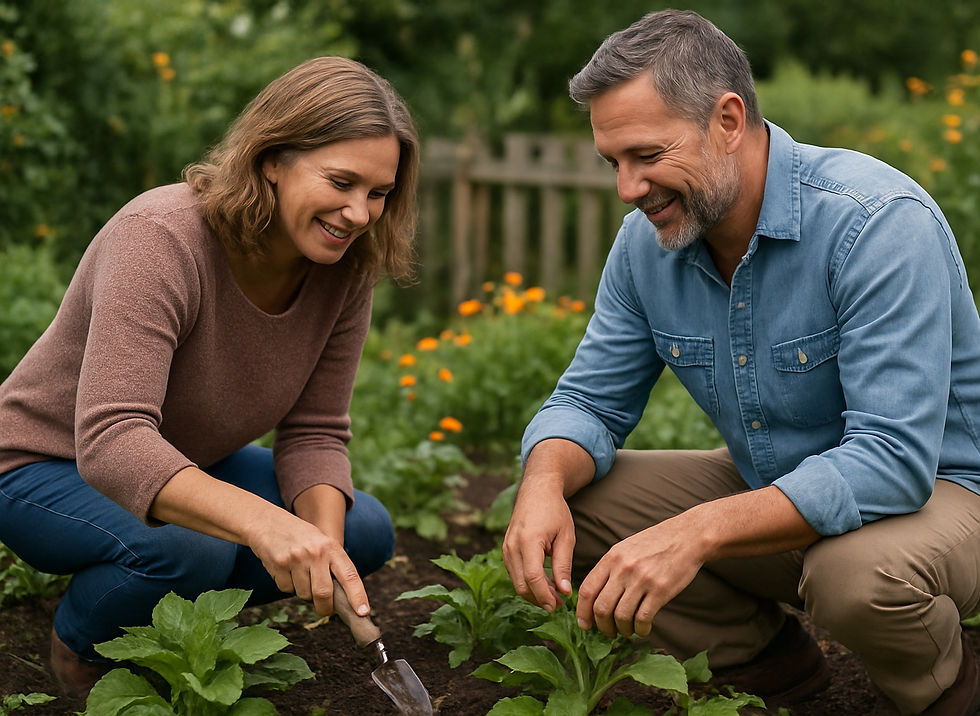Love Without Limits
- Dawna Peterson
- Sep 13
- 3 min read
"For God so loved the world that he gave his one and only Son... For God did not send his Son into the world to condemn the world, but to save the world through him" (John 3:16-17).
This Sunday's reading includes one of the most quoted passages in the Gospels, and with good reason: it reveals something profound about the nature of transformative love. God's love is given without conditions and seeks restoration rather than condemnation. And this is the kind of love God calls us to in our vocation of marriage.
Research in psychology and relationship science mirrors the lesson of the Gospel: these same principles, when applied in marriage, create the conditions for extraordinary human flourishing. It suggests that the secret to a thriving marriage isn't found in better communication techniques or conflict resolution skills (although these are important tools), but in something far more fundamental—the quality of acceptance we offer our partner.
Psychologist Carl Rogers revolutionized therapy with his concept of "unconditional positive regard"—the practice of accepting and supporting another person regardless of what they say or do (Rogers, 1957). While Rogers applied this to the therapeutic relationship, decades of research have shown that this same principle transforms marriages.
The Research is Clear
Studies consistently show that couples who feel fundamentally accepted by their partners report higher relationship satisfaction, better emotional regulation, and greater individual growth. When we know we're loved without conditions, we stop exhausting our energy on self-defense and can instead invest in becoming our best selves.
Dr. Sue Johnson's work on Emotionally Focused Therapy reveals that the couples who thrive aren't those who never fight—they're those who create "secure emotional bonds" where both partners feel safe to be vulnerable. This safety emerges when each person knows they won't be rejected for their struggles, fears, or imperfections.
What This Looks Like in Practice
Unconditional positive regard doesn't mean accepting harmful behavior or abandoning boundaries. Rather, it means separating your partner's inherent worth from their actions. It's the difference between "You're so selfish" and "When you behave like that I feel disrespected and believe I am being taken for granted."
Research on attachment styles shows us that when people feel unconditionally accepted, they actually become more capable of growth and change. Paradoxically, when we stop trying to fix or improve our partner and instead offer them radical acceptance, they often naturally evolve toward their best self.
Neuroscience research reveals that brains literally change in environments of consistent safety and acceptance. When we feel genuinely loved without performance requirements, our nervous systems calm, our creativity increases, and our capacity for empathy expands.
Creating This Environment
Start small. Notice moments when your internal critic wants to judge your partner, and pause. Ask yourself: "What would it look like to respond to this person as someone I'm committed to loving, regardless?" Often, this simple shift opens up entirely new responses—curiosity instead of criticism, compassion instead of condemnation.
The most robust marriages aren't built on finding the "right" person, but on becoming people who can offer love without limits. When both partners feel fundamentally accepted, marriages can become launching pads for mutual flourishing.
Conclusion
The Gospel passage reminds us that love's ultimate expression isn't found in judgment but in giving—even sacrificial giving—in order to transform the beloved. Modern relationship science confirms this ancient wisdom: when we approach our marriages not as judges seeking to criticize and correct what's wrong, but as lovers committed to our partner's flourishing, we can create the conditions that allow both people to become their truest, most whole selves. In choosing love without limits, we mirror something sacred and participate in the profound work of human restoration.
What would change in your relationship if each time your partner's behavior irritated or upset you, you asked: what can I do right now to show love for them?
If you found this inspiring, you might also like:




Comments